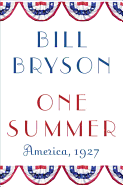
"History is bunk," said Henry Ford, one of the larger-than-life characters in Bill Bryson's One Summer: America, 1927. But Bryson's comprehensive and consistently entertaining history of that momentous summer certainly debunks the automotive pioneer's dismissive judgment.
Of the several epic figures who anchor One Summer, the most noteworthy is 25-year-old Charles Lindbergh, whose nonstop flight from New York to Paris on May 20-21 catapulted him to fame, inspiring a "moment of sublime, spontaneous, unifying joy on a scale never before seen." Americans in 1927 were also awed by Babe Ruth's epic chase to hit 60 home runs as he led what was probably the greatest baseball team of all time; and they flocked to the first talking movie, The Jazz Singer. The first demonstration of television occurred that year, and 30 million people listened to the Dempsey-Tunney "long count" fight in September.
But all wasn't achievement and celebration. The catastrophic Mississippi River flood devastated an area almost the size of Scotland; 38 children were killed in an elementary school bombing in Michigan; the anarchists Sacco and Vanzetti were executed; and the world's central bankers made a fateful decision on interest rates that, Bryson (I'm a Stranger Here Myself, A Walk in the Woods et al.) asserts, laid the groundwork for the stock market crash two years later. He relates these stories and many more with deft pacing and sufficient dashes of his trademark wit to entertain readers, all the while conveying impressive helpings of historical fact.
It's impossible to come away from this energetic account without a strong sense of the vitality that animated American life in that raucous summer; 1927 must have been a thrilling time to be alive. --Harvey Freedenberg

